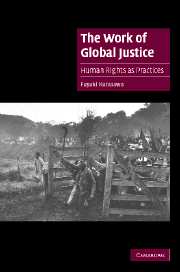Book contents
- Frontmatter
- Contents
- List of figures
- Preface
- Introduction: Theorizing the work of global justice
- 1 A message in a bottle: on bearing witness
- 2 The healing of wounds: on forgiveness
- 3 Cautionary tales: on foresight
- 4 The stranger's keeper: on aid
- 5 Cosmopolitanism from below: on solidarity
- Conclusion: Enacting a critical cosmopolitanism
- References
- Index
- Cambridge Cultural Social Studies
4 - The stranger's keeper: on aid
Published online by Cambridge University Press: 01 December 2009
- Frontmatter
- Contents
- List of figures
- Preface
- Introduction: Theorizing the work of global justice
- 1 A message in a bottle: on bearing witness
- 2 The healing of wounds: on forgiveness
- 3 Cautionary tales: on foresight
- 4 The stranger's keeper: on aid
- 5 Cosmopolitanism from below: on solidarity
- Conclusion: Enacting a critical cosmopolitanism
- References
- Index
- Cambridge Cultural Social Studies
Summary
Overcoming poverty is not a gesture of charity. It is an act of justice. It is the protection of a fundamental human right, the right to dignity and a decent life.
(Nelson Mandela in Bedell 2005: 64)Humanitarian action is more than a technical exercise aimed at nourishing or healing a population defined as ‘in need’; it is a moral endeavor based on solidarity with other members of humanity.
(Terry 2002: 244)Our lives matter. The five million people in South Africa with HIV matter, and the millions of people throughout the world already infected with HIV matter. So it is not simply a question of cold statistics we are putting to you, but a question of valuing every person's life equally. Just because we are poor, just because we are black, just because we live in environments and continents that are far from you does not mean that our lives should be valued any less.
(Achmat 2003: xv)Introduction
To be one's sister's or brother's keeper: a seemingly innocuous yet potentially ethically infinite injunction to help others, especially when they find themselves in situations of extreme vulnerability. Perhaps to tame its prescriptive weight, most of us have chosen to interpret it in a restricted fashion by applying it primarily, or even exclusively, to members of fairly circumscribed and proximate moral communities.
- Type
- Chapter
- Information
- The Work of Global JusticeHuman Rights as Practices, pp. 126 - 156Publisher: Cambridge University PressPrint publication year: 2007

